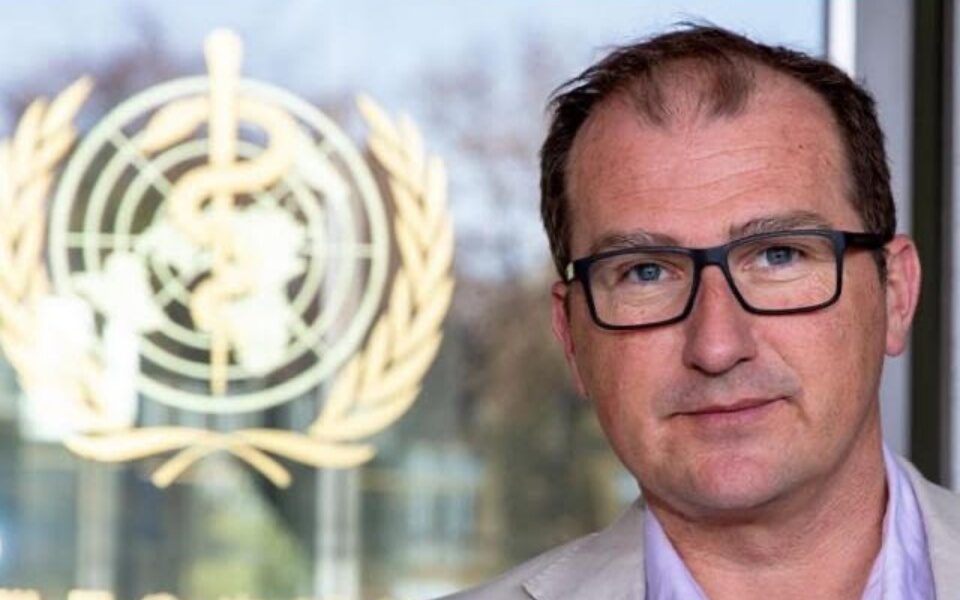Omicron will not be the last Covid-19 variant, WHO spokesman warns

World Health Organization spokesperson Tarik Jasarevic lays out the good and the bad news around the Omicron variant of Covid-19. Omicron is milder than Delta, he says, but it remains a dangerous virus – and it will most certainly put a strain on the healthcare system.
Jasarevic points out that Omicron is also a risk for people who have already contracted the virus. Meanwhile, he says that the variant’s high transmissibility could push Covid-19 toward becoming endemic in the population, although “we are very much right now in the middle of this pandemic.”
Jasarevic says that Omicron will most likely not be the last mutation we experience. As a result, we must aim to reduce transmission and increase vaccine coverage. “The goal by mid-2022 must be for every country to vaccinate 70% of its population,” he says.
The initial estimation in the case of Omicron was that the rate of increase in hospitalizations and deaths is much lower than the rate of increase in infections. Is it confirmed that this is a less dangerous mutation?
While Omicron causes less severe disease than Delta, it remains a dangerous virus, particularly for those who are unvaccinated.
Omicron has a significant growth advantage, meaning that it is spreading faster than Delta. Transmission has been occurring even amongst those vaccinated or with a history of prior infection. There is increasing evidence that this variant is able to evade immunity.
An increase in cases will lead to an increase in hospitalizations, which may put an overwhelming demand on the healthcare system and lead to a higher number of deaths, particularly in vulnerable populations.
In terms of disease severity, there is growing evidence that the Omicron variant is less severe as compared to other variants of concern. Data suggest that infection with Omicron may be associated with a lower risk of hospitalization compared to infection with Delta. The severity of illness increases with age and in the presence of underlying medical conditions and among people who are not vaccinated.
Does Omicron domination limit the chances of a new mutation appearing?
This virus is still evolving and we don’t know what the next variant will look like but this will likely not be the last variant that we are seeing.
Some believe Omicron’s high transmissibility is rapidly boosting herd immunity and thus accelerating the end of the pandemic. What is your opinion?
This virus is on its way to becoming endemic. There’s no question about that, but we are very much right now in the middle of this pandemic.
We are seeing a strategy of booster shots globally. Is that something that could be avoided in the future? Are the existing vaccines adequate or should they be adapted since new mutations have appeared?
In September last year, WHO established the Technical Advisory Group on Covid-19 Vaccine Composition, or TAG-CO-VAC, a group of experts to review the implications of variants of concern on vaccines.
Recently, TAG-CO-VAC said that more vaccines will be needed that have a greater impact on preventing infection and transmission, as well as severe disease and death.
Until such vaccines are developed, the composition of current Covid-19 vaccines may need to be updated, to ensure they continue to provide WHO-recommended levels of protection against infection and disease.
TAG-CO-VAC also said that a vaccination strategy based on repeated booster doses of the original vaccine composition is unlikely to be sustainable.
TAG-CO-VAC also emphasized that while some countries recommend boosters, the immediate priority for the world is accelerating access to primary vaccination, particularly for groups at greater risk of developing severe disease.
There is growing evidence on vaccine effectiveness for Omicron, but we still have a lot to learn. So far, we think that vaccines are less effective against Omicron infection and symptomatic disease compared to Delta. Having a booster shot seems to increase protection. However, vaccines still seem to remain highly effective at protecting you against serious illness, hospitalization and death.
We expect some therapeutics (corticosteroids and interleukin-6 receptor blockers) to remain effective for treating disease caused by Omicron, where they are used appropriately. However, others (monoclonal antibodies) may be less effective against Omicron. Studies are ongoing.
We need to rapidly accelerate efforts to vaccinate all at-risk populations in all countries. People who are still unvaccinated should get vaccinated as soon as they can.
The emergence of Omicron means that the protective behaviors remain critical (keeping a safe distance from others, avoiding crowds, wearing a well-fitting mask covering your mask and nose, cleaning hands regularly, keeping indoor spaces well ventilated, and covering coughs and sneezes).
What should governments look out for at this stage of the crisis? Where should they put the emphasis?
In the face of Omicron, our focus must be on reducing transmission and increasing vaccine coverage.
The goal by mid-2022 must be for every country to vaccinate 70% of its population. We can end the acute phase of the pandemic if we vaccinate populations, starting with those most at risk.





